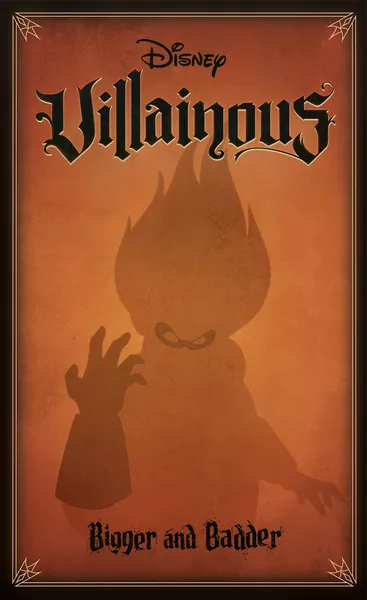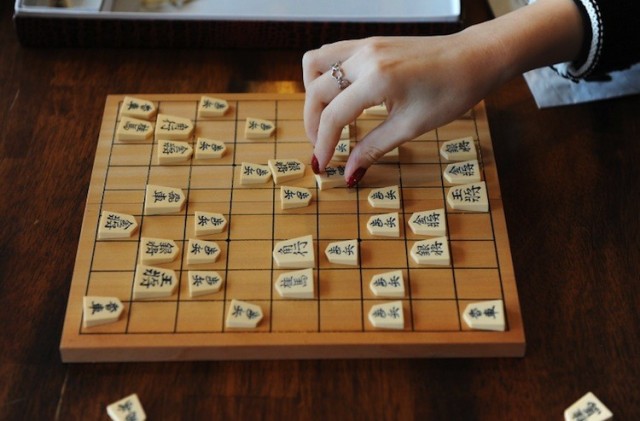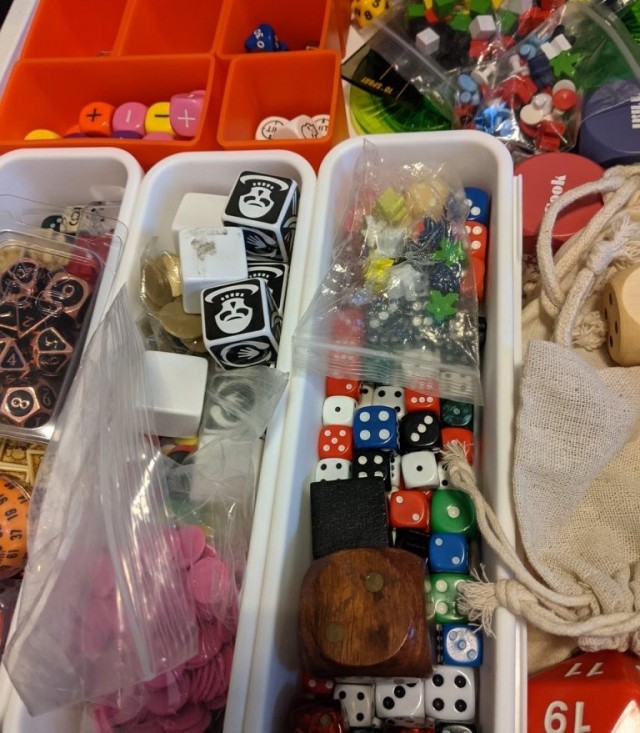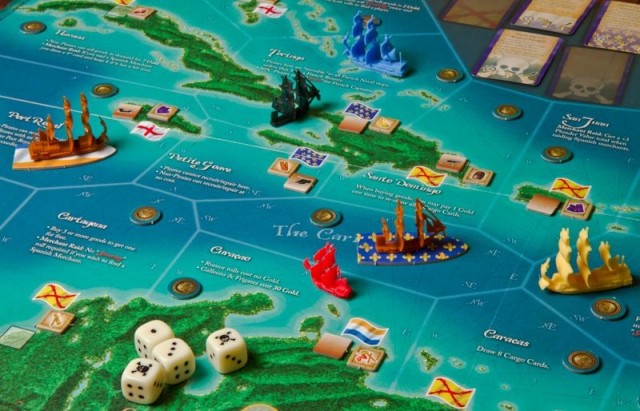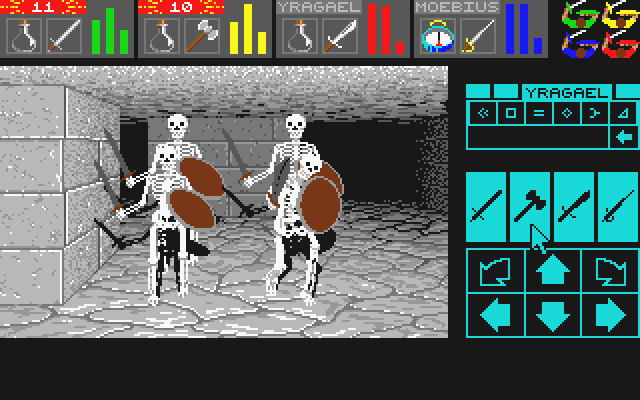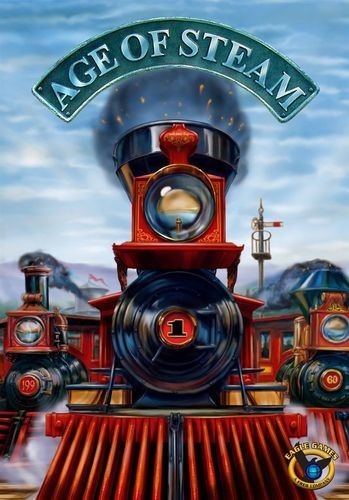Sorry there's no new material this week: I've been caught out being really busy at work and at home and there's been no time. Plus I'm told today is a holiday in the US so you lot should all have better things to do. However I had a look over at our old blogger site to find some of my old material for a F:AT looks back column. This piece is about social interaction in games where it's not specifically encouraged by the rules, a topic that I don't think I've ever revisited and which remains relevant today, so it'll be interesting to see what ideas people have on the subject today compared with 2007.
I played Railroad Tycoon for the first time this weekend, a game I'd snapped up when poor old Eagle Games (the only other committed publisher of AT games besides FFG) went bust. Game went down pretty well with my friends, and although I'm lukewarm about the theme and the board is annoying on multiple levels I'd give it a cautious thumbs up.
One of the game mechanics is an auction to see who goes first each round - highest bidder pays the money and gets the honours, then it follows clockwise. So the person sitting to the left of the high bidder basically gets a free advantage. At some point during the game we played I was one of two players left in the auction, and after my opponents had made a bid increase I voiced my concern that it was really worth my while upping the bid again, just by way of table chat, you understand. The player on my left, who was out of the auction, then offered to give me $1000 if I'd increase my bid by the same amount. He'd be going last if the other player still bidding won so it was totally worth his while to effectively bid a small sum for the chance to go second. This caused uproar round the table with some players condoning the action, others condemning it. In the end, to silence the fuss I increased my bid, won the auction and took the $1000 and gave it to the player who'd remained silent during the argument!
The point of this lengthy introduction is to illustrate a source of fairly fierce argument amongst gamers of all stripes which is the legitimacy of allowing negotiation and social interaction in games which do not specifically set it down as part of the rules. There are a number of games which are built around the concept of negotiation but there are equally a number of games (Puerto Rico is a good example) which say nothing about negotiation in the rules but which would be easily and completely ruined if two players started conspiring together. The largest class of games is a third, to which Railroad Tycoon belongs, which fall into a grey area between the two in which negotiation is not discussed in the rules but it's impact upon the game is less clear.
I kind of have a silly thing about rules - I regard them as being fairly sacrosanct to the point where I'm unwilling to add house rules or variants even to improve games that are obviously begging for changes. After all the rules are the rules - without them you don't actually have a game at all. Plus I think it's kind of fun to enforce silly rules, like demanding to be called the Lord of Catan after winning a game of Settlers. So I'm totally siding with the legions of fans who ask that designers actually make a point of saying in the rules whether or not negotiation and/or resource exchange (which often accompanies it) are allowed as part of the game. At the moment the unwritten consensus seems to be that unless it's specifically listed as an aspect of the game then it's not allowed which I think is a great shame. A number of games I'm fairly fond of (Citadels for example) say nothing about it in the rules but would be spoilt for me if they excluded plotting and conniving from the game experience.
I think this state of affairs has arisen because a lot of Euro fans really don't like the chaos and unpredictability that trade and negotiation can inject into otherwise pure and balanced game designs. Indeed I've seen people complain that after a while all games which include this play element eventually turn into the same meta-game where negotiating and trading over favours and alliances effectively becomes the game, relegating other mechanics to the background and rendering all plays strikingly similar. When I first heard this point of view I thought it interesting and quite possibly accurate, although I personally don't seem to tire of the meta-game because it offers huge variety even within the strictures of being a similar experience every time - far more so than the limited play options that seem to arise from game designs that follow their fundamental maths too closely. But on inspection I'm not entirely sure that the argument holds up.
Consider. In the first instance we have the sort of negotiation offered in multiplayer conflict and empire building games which I suspect is the genre most people have in mind when they make this complaint. Games like Diplomacy and A Game of Thrones are completely built around this aspect of the play whereas others like crusty old Risk (much improved in its latest outing) don't strictly forbid it and a lot can be added to the play experience by allowing it. These games are basically about effective lying - you need to persuade other players that you're either not a threat or are offering a very serious threat in order to get them to behave in a way that suits your purposes regardless of whether you actually plan to attack them or not. Play enough of these games and they will, eventually, turn into the same meta-game already described.
But wait - there's lots of other games which encourage different types of negotiation. Games likeTraders of Genoa and to a lesser extent Settlers, described above, encourage players to negotiate around trade. This is entirely different - here you're not lying to try and build alliances or protect weak fronts but instead your negotiating over value and there's no need to lie - the drive to negotiate comes from either hidden information or a simulation of market conditions. Other games, such as Titan allow some limited negotiation based on circumstance and assessment of the relative players' skills. Games with co-operative elements like Fury of Draculaencourage positive negotiation within small groups or indeed amongst all the players if they're playing against the game system itself. I'm sure I could expand this list if I tried, but frankly I'm getting bored, so let's move on.
A long, long time ago over on BoardGameGeek there was a brief trend for making geeklists based around online personality tests. I'm dubious about these sorts of tests but I'll admit that as long as you're painting with very broad strokes they can offer some sort of insight and interesting information. It seemed at the time that most of the respondents to these lists came out as being categorised in varying degrees of introversion - maybe not surprising for a self-labelled "geek" site. But not me - I kept coming out as an extrovert. There's been a lot of discussion about the demographics of the Ameritrash fan movement - age, occupation, martial status and so on - but I'd like to suggest that the introvert/extrovert division is another guide for whether people are likely to prefer Euro over AT games. A lot of AT games encourage a loud and boisterous game experience and negotiation of some kind or other is a cornerstone of that kind of gameplay.
So that brings us back to Railroad Tycoon, based on the classic out-and-out Euro design Age of Steam. It is in fact a Eurogame much beloved by the AT crowd not an AT game itself. So was the player to my left right or wrong to offer me the $1000? On the right side we might offer that here's a solution to the oft-quoted problem of RRT taking the AoS mechanic of allowing turn order to proceed in order of bid value amongst all players and turning it into a winner-takes all scenario that hands a bid advantage to the player of the left of the winner for no cost. On the wrong side we've got the suggestion that AoS was playtested with the rule that a player who passes is out of the auction, making passing a more difficult decision and that by offering a bribe, a player can circumvent this stricture and unbalance the game. Who was right? Answers on a postcard please to ... the comments button.
 Games
Games How to resolve AdBlock issue?
How to resolve AdBlock issue? 
